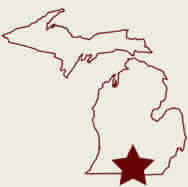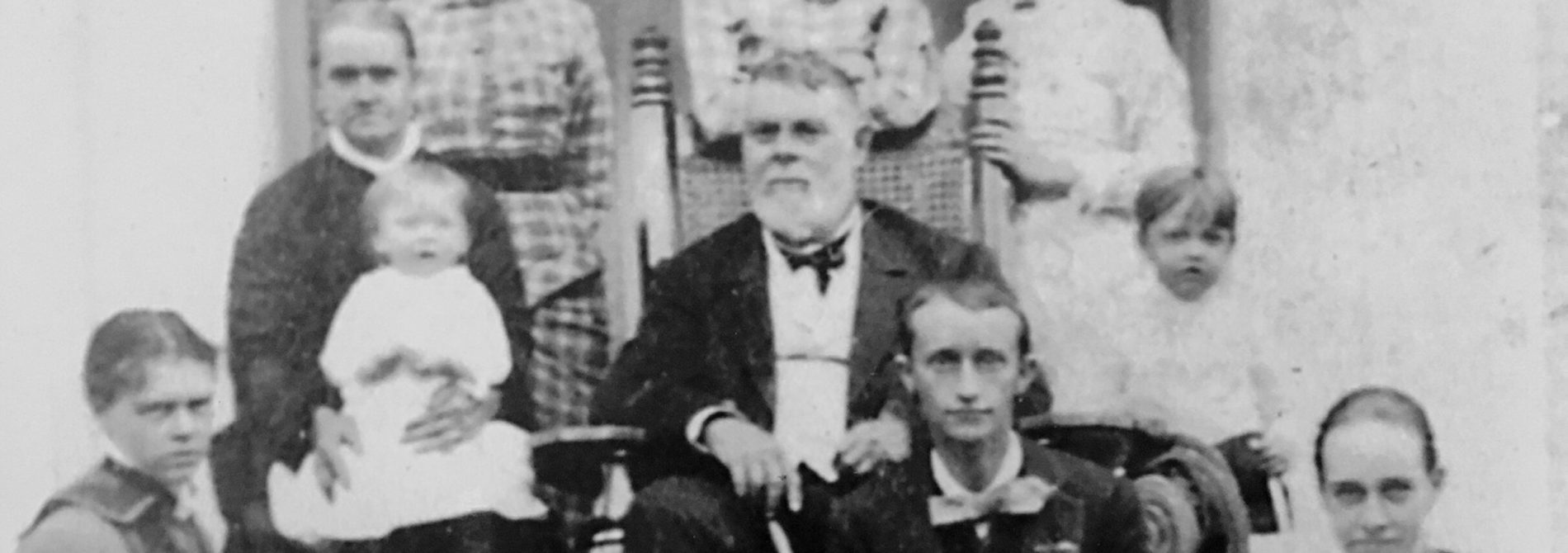MUNRO FAMILY HISTORY
George Clinton Munro: On His Wedding Day in 1840 As Masonic Grand High Priest
Obituary from Jonesville Independent Newspaper:
George Clinton Munro (01/22/1814 – 1883) Born in Elbridge, Onondaga County, New York. One of the first to engage in Mercantile Business in Jonesville. He traded with the Potawattomie Indians and their Chief Baw Beese, Member of the firm of E. P. Champlin & Company, Partner in the firm Munro & Lewis which built and started Jonesville’s first Foundry, built and operated the first Mill in Litchfield, was for many years one of the leading and public men in Southern Michigan. Was a contractor on the Michigan Southern Railroad, elected to the Vestry of Grace Episcopal Church, erected the first brick house in Hillsdale County, was Hillsdale County’s first elected County Clerk (1836) and served 3 one year terms, was elected County Coroner (1845), was elected first President of the Village of Jonesville (1855 and 1863), Served as Trustee, was Supervisor of the Township of Fayette (1875), was on the School Board, was Justice of the Peace (1863-1875), was President of the County Pioneer Society, was Democratic Candidate for State Senator, State Treasurer, and Lieutenant Governor (all unsuccessful), was an active member of the Executive Committee of the Michigan State Agricultural Society and at one time its President. He was commissioned Colonel of Militia and afterwords Brigadier General. The title “General” sticking to him till the day of his death. He was one of the most prominent Masons in Michigan, was a charter member of the Lodge of I.O.O.F. in 1846, and charter member of the Jonesville Encampment I.O.O.F. in 1848, and a member of, and at one time the Eminent Commander of Eureka Commandery #3 Knights Templar, and at the time of this death was the oldest living member of La Fayette Lodge, F.&A.M. He was the Master of La Fayette lodge for 10 years in succession and was its High Priest for many years. He had been Grand Master of the State and Grand High Priest of the Grand Chapter of the State. He was the father of 14 children.
- George Clinton Munro (1814 – 1883)
- Elizabeth Catherine Quintard Leake-Munro (1817 – 1848)
- Godfrey L. Munro (1841 – )
- Cornelia Munro (1843 – )
- Harriet Munro-Robbins (1844 – )
- Clara Munro (1846 – 1877)
- Elizabeth Catherine Munro (1848 – )
- Clara Matilda Leake-Munro (1826 – 1913)
- Mary Munro-Gay (1851 – 1949)
- Alice Munro (1851 – 1943)
- George Edward Munro (1854 – 1869)
- Cynthia Munro-Barkman (1856 – )
- Julia D. Munro-Davis (1858 – 1944)
- Anna Munro-Smith (1860 – 1883)
- Margaret Munro-Kirby (1862 – 1929)
- Emma H. Munro (1865 – )
- Caroline Delevan Munro – (1866 – 1878)
From www.Ancestry.com American Biographical History of Eminent and Self-Made Men with Portrait Illustrations on Steel, Volumes I-II:
Name: George Clinton Munro of Jonesville, was born in Elbridge, Onondaga County, New York, January 22, 1814; and is the eldest son of Nathan and Cynthia (Champlin) Munro. He is of Scottish descent on the paternal side. Three brothers of the name, who lived in Scotland, emigrated to this country at an early day, immediately after a disastrous war with England, in which their property was confiscated.
His father, Nathan Munro, was a very successful merchant and banker, who was born in 1791, and died in 1839. He was a liberal patron of educational institutions, and was the founder of Munro Institute, located at Elbridge, New York. Several of his sons are graduates of Yale College, and have gained some political prominence in New York,–two having been members of the State Senate, and one being a member of that body at the present time.
George C. Munro began his education in a select school in Skaneateles, New York, at the age of seven; and remained there two years. The years between seven and twelve he spent in the Onondaga Academy. He next became a student in the Polytechnic Academy at Chittenango, remaining until almost fifteen years of age, when he went to Rensselaer School at Courtland, and prepared for college, entering Yale at sixteen. He had been a close student up to this time, when his health failed, and he was advised by the family physician to relinquish his studies. He gave up his projected college course, and entered his father’s store as clerk, continuing in this employment for four years. Becoming somewhat dissatisfied with his position, and wishing to begin business for himself, he removed to the Territory of Michigan, in August, 1834.
George Munro at once engaged in mercantile and real estate business in Jackson, Lenawee, and Hillsdale counties, having his head-quarters at Jonesville, where there were thirty or forty male inhabitants. He continued this business, in connection with running flour-mills in Litchfield and Jonesville, until 1852, when he engaged in the hardware business. This was carried on until 1862, when he sold out his interest to his partner, Mr. Lewis.
Mr. Munro had been, in the meantime, a contractor for erecting road-bed and railroad buildings for the Michigan Southern Railroad, having a train placed in his charge for transporting material. He was, also, a contractor on the Fort Wayne, Jackson and Saginaw Railroad.
He has been somewhat extensively engaged in farming, but fortunately sold his land when land was high. Since 1862, he has been chiefly employed in the duties of a Justice of the Peace, collecting agent, and money lender.
After the opening of the Civil War, he was actively engaged for two years in recruiting soldiers, and giving his aid in the vigorous prosecution of the war. He has been Assessor and Supervisor of Jonesville for a number of years, and Justice of the Peace for nearly twelve years, having always been elected without party feeling. He has, at different times, been candidate for State Senator, Lieutenant-Governor, and State Treasurer, on the Democratic ticket; but suffered a party defeat in each instance. He was a delegate to the United States Democratic Convention held at Baltimore in 1860, and also to the National Democratic Convention of St. Louis in 1876.
Upon the formation of the State Agricultural Society, Mr. Munro was appointed one of the Executive Committee, and was afterwards elected President of the society. He is a life-member of the Hillsdale County Agricultural Society, and has been both President and Treasurer. He has always taken an active interest in the subject of agriculture, and the general improvement of live stock throughout the country.
Mr. Munro has identified himself with all the public enterprises of the village. He was elected first President of Jonesville on its incorporation, receiving almost the entire vote. He took great interest in securing free schools and union schools, and, in 1847, built the first union school-house. He was moderator of the first union school in the State, and a member of the School Board for eighteen years, being Director part of the time. He was a charter member of the order of Odd-Fellows, which was organized in 1846 at Jonesville. He has passed all the chairs in the order, and is now a member of the Grand Lodge of the State, in which he has held all the minor offices. He has served as Noble Grand a number of times.
He became a member of the Masonic Fraternity in 1848. He was Worshipful Master of his own lodge for ten years; and a representative to the Grand Lodge of the State, of which he was afterwards, in order, Junior Warden, Senior Warden, Deputy Grand, and Grand Master. He was made a Royal Arch Mason in 1850 at Jackson, and resigned, the same year, in order to become a charter member of Jonesville Chapter, No. 8, of which he was High Priest for several years. In the Grand Chapter he has been elected successively to the following offices,–Treasurer, Grand Scribe, Grand King, Deputy Grand High Priest, and Grand High Priest. He was made a Knight Templar in the Detroit Commandery No. 1, in 1851, from which he withdrew in 1858, becoming a charter member of Eureka Commandery No. 3, at Hillsdale, of which he has been Eminent Commander.
Mr. Munro has never connected himself with any religious denomination, but is a regular attendant of the Episcopal Church, contributing to its support. His political views have been strongly Democratic from his youth up. He married, October 13, 1840, Miss Elizabeth C. Leake, who resided at the head of Seneca Lake, New York. She died January 11, 1848, leaving five children. On the 13th of March, 1849, he married Miss Clara M. Leake, a sister of his former wife, by whom he has had nine children. Of his fourteen children, twelve are now living. Mr. Munro is a gentleman of great geniality, and is highly esteemed by all who know him.


